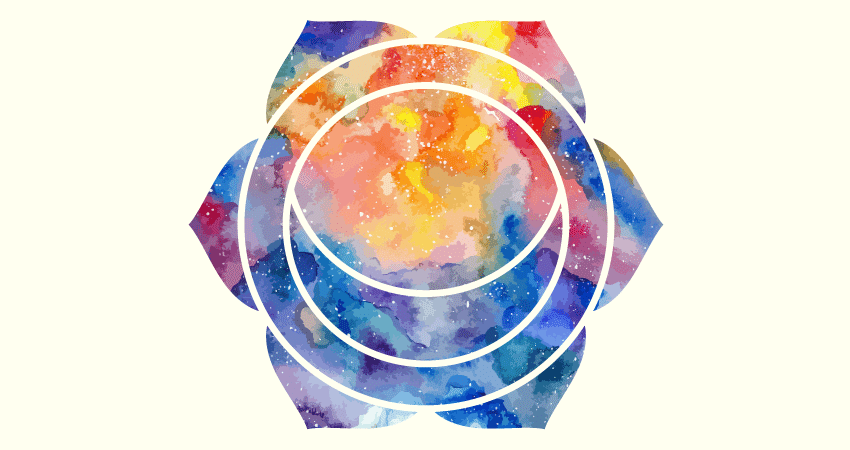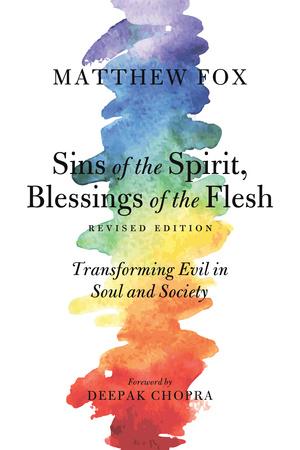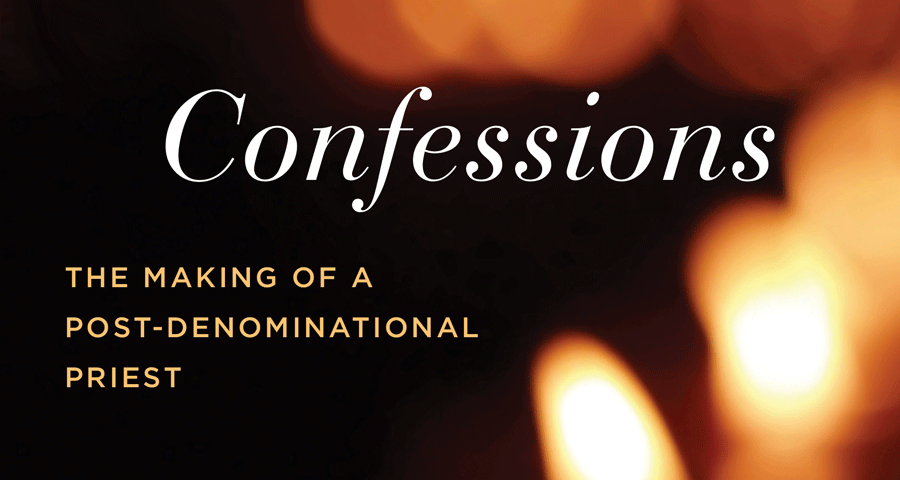
The Second Chakra: Sexuality and the Feminist Philosophy of Nondualism
Categories: Excerpt Society & Politics Spirituality & Religion
Talking about evil is difficult, Matthew Fox says, because our language about evil needs to evolve to meet our times. Thus, Fox proposes a new language for understanding evil in his revised edition of Sins of the Spirit, Blessings of the Flesh, wherein he explains how the chakras teach us to direct the love-energies we all possess and proposes seven positive precepts for living a full and spirited life.
In the face of evils of our current climate—such as the corrosive dualism of patriarchy and its resultant violence, the negative side to lust—Fox’s new language for understanding evil invites us to change the way we think about sin, asserting that we can combat and transform the evils of the world through love, generosity, creativity, and letting go.
The second chakra is about sexuality and a feminist philosophy of nondualism. The second chakra is about feminism because it is about finding a balance between matter and spirit, the sensual and the spiritual, the sexual and the mystical. It is about finding an ongoing balance between giving and receiving, yang and yin, flowing and ordering, yielding and urging. It is about rejecting dualisms. Traditionally, the sin corresponding to this chakra would be called lust. Lust can be one sided, and that is its negative side: It can be dualistic, that is to say, it can be a situation of creating power over another (or power under) instead of its being an expression of union and of equality or the search for union and equality. But lust can also be a virtue.
The Good Side to Lust
None of us would be here without lust. Our parents’ lust is what brought us into this world. Lust in itself, then, is holy and sacred. It is sacred desire wanting to penetrate and connect to another. Lust is a driving force that can be a happy expression of love and caring, of hope and promise insofar as it includes the dynamics for bringing another being into the world. It is not just the lust of our human parents that has brought us to this place but the lust of their parents and others before them and others before them. It is the holy lust of all our ancient ancestors that we can thank for our being here.
Tantric sexual practices are one example of the praxis of sexual pleasure that are promised even in the Western Scriptures (in the Song of Songs) as a theophany or sacramental experience for lovers. Of course sexuality, like any rich experience, can be turned into an addiction and therefore a problem. But when we have developed skills of letting go and letting be and learned to become emptied, sexuality does not overtake us as an obsession will.
And it is not just our human ancestors whose lust brought us here. The lust of animals that have blessed us with their company, their beauty, their shelter, their companionship, their meat, their wonder—we owe them and their lust a debt of gratitude as well. Also, the lust of flowers that bear fruits and grains that strive so hard to spread their pollen amid the winds blowing and the insects flying—all the lust of the world that makes us be and live and ourselves be lusty. So many to thank for our lust. Hildegard of Bingen, who possessed a powerful cosmology, understood the deep connection between the sexual and the earthy when she wrote:
The fertile Earth is symbolized by the sex organs, which display the power of generation as well as an indecent boldness. Just as unruly forces at times rise form these organs, the recurring fertility of the Earth brings about a luxuriant growth and an immense overabundance of fruits…. Just as the power of correct procreation and infirmity, of happiness and misfortune, lie hidden within the sex organs, and just as the Earth causes both useful and useless things as well as everything needed for human existence to germinate through the sun, moon, and air, there exists a mighty power within the soul. By this capacity we are able to bring to fulfillment both good and evil, both useful and useless things.1
All this generatively is part of what we honor in the second chakra. All our interconnectivity that reveals itself in sexuality as an intimate interconnectivity. Interconnectivity is not neutral or distant or abstract. It is as close as touch is; as close as smell is; as close as two bodies can be. Eros is profoundly near. Intimate. Reciprocal. When lust is this way it is part of the blessings of life. “True love between persons is enhanced and reinforced by the sexual act,” as Rabbi Solomon Schimmel puts it.2
There is a gentle side to our sexuality as well, and we call that intimacy. In intimacy we practice closeness and caring, regard and respect, affection and deepening of friendship. Intimacy teaches us warmth and caring, even fondness and tenderness on a one-to-one basis. These are not minor lessons to carry through life or into the other chakras. The opposite of intimacy may be objectifying the other. The second chakra ought to teach us the important lessons of intimacy, not their opposite.
Lust’s Negative Side: Objectifying The Other
Sometimes the way we deal with our lust is not a blessing and is not healthy. In fact, I think it deserves a different name. A name like violence. Or addiction. Or force that bears us away. Or obsession. Or control. Or dualism. Or rape. Or objectifying. Or sexism. Or homophobia. Our language is rich in terminology that names the reality of the sexual chakra when it is off-balance: abuse, violation, molestation, dissolution, depravity, lechery, debauchery, licentiousness, lewdness, dissipation, carousal—would we have so many words if we did not also have the experiences to back them up? When lust becomes a vehicle for objectifying, it is no longer an intimate expression or a generative one; it is a power that needs checking, a stallion that needs bridling; a force that needs tempering.
Rabbi Solomon Schimmel teaches that lust is more powerful than shame, guilt, fear, prudence or gratitude.3 It does indeed need bridling at times. Lust despises after it enjoys, and when lust is interested in the other “as an object rather than as a person, [it] finds no use for the object once the gratification it afforded has been attained.”4 He offers the example of King David’s murdering the husband of his lover as evidence that “lust will commit the most savage crimes to satisfy itself.”5 David’s lust set a bad moral example—David’s crime led to his son’s raping his half-sister, Amar. “Not only does a sinful father lose his moral authority over his children, but they also learn to imitate him.”6 Schimmel defines lust as the “divorcing of sex from ethics and charity,”7 and he calls for self-control regarding our sexual powers. Where “the sexual act is unethical it should not be performed. If we are unfaithful, dishonest, violent, exploitative, or in some other way harm others or ourselves, we are morally guilty of lust.”8
Biologist Lyall Watson attributes most of humanity’s violence to sex, for he believes that our genetic code demands that we reproduce no matter what the cost. “The subject which most occupies the big brain of the naked ape, filling more of its mind and time, flowing over into almost all of its other endeavors, is sex.” The reason for this is that “evolution seems to work, almost exclusively at its more complex levels, by competitive reproduction.”9 And competition abounds. Men against women and men against men and tribe against tribe—seemingly it is all about whose genes will carry forward into future generations. We have inherited the genetic urges from our animal forbears, and we cannot deny its strength and assertiveness.
Our sense of beauty, our capacity for love, our widespread tendency to be jealous and aggressive, even our vaunted intelligence—all the things which seem to make our species so special are natural consequences of our preoccupation with sex…. We are the sexiest of all the primates and though this may sometimes seem like a recent, decadent development, it is worth remembering that it has been this way for millions of years.10
Because men can become biological parents in a few seconds and women take about 266 days with a being that dwells within them while becoming mothers, the two sexes have somewhat different agendas and different modus operandi. “Men are a little like selfish genes, looking for convenient vehicles to carry their inheritance into the next generation. Women are more cautious, like canny investors or developers, seeing men as inconvenient sources of a seminal substance that is nevertheless necessary to realize the potential of their precious nest eggs.”11 Developing his rather unromantic view of sex, Watson proposes, along with his colleague William Hamilton, that much of our sexual drive is an effort to stave off disease. Because sexuality so shakes up our DNA, it provides a kind of vaccination keeping our offspring one step ahead of parasites. “We are in a perpetual battle with parasites, and keeping them out means changing locks a little faster than they can change keys.”12 Competition enters the picture from both sides: Women want the best genes possible and so they may want the conqueror over the conquered; and men who conquer other males “leave more offspring than those conquered.”13
Watson does not discuss, however, the most overriding issue around sexuality and progeny today, and that is the population explosion. Indeed, the very radicalness of sexuality being the cause of so much competition and strutting in the world is put into question in a time when our species wakes up to the unpleasant fact that there is enough of us or maybe even too many of us. How will this awakening change our sexual drives? And what about artificial insemination— does this eliminate the male’s number one raison d’être? How will the masculine gender pass its time if it is not necessary for the sexual process, which indeed needs to be slowed down anyway? All this suggests that biology can tell us of our past inheritances, but perhaps not too much about the future. For that we might have to look to the spiritual side of sexuality and look more deeply than we are accustomed to look during this period of sex-for-immortality-sake.
Our energy of desire is one; it seeks union and generativity of one form or another. When it is thwarted, a kind of seething occurs and violence can naturally result. The thirst of desire wants an outlet. That is why the second chakra with its emphasis on intimacy with another has so much to teach us. Theologian Cornel West believes that the violence of insatiable desire is built into the very economic structures of our culture and that the “market morality” of our day is destroying the healthy nature of lust and sexuality. The result is that we get distracted from the true values of life such as love, care, and service to others. This market morality “stigmatizes others as objects for personal pleasure or bodily stimulation…. The reduction of individuals to objects of pleasure is especially evident in the culture industries—television, radio, video, music—in which gestures of sexual foreplay and orgiastic pleasure flood the marketplace.”14 The powerful engines of the marketplace, especially advertising, “promote addictions to stimulation and obsessions with comfort and convenience. Addictions and obsessions—centered primarily around bodily pleasures and status rankings—constitute market moralities of various sorts.”15
To make another who is always a subject into an object is asking for unbalance in our chakras and unbalance in our relationships. A subject has his or her integrity and has a right to say no as well as yes. This respect for the integrity of another applies not just to sexual actions but to the very process of our relating in friendship and justice to others. The fact that intense passions accompany the sexual act, passions upon which our very species has long relied for its survival, intensifies the lessons to be learned in this chakra: lessons of mutuality and reciprocity and give and take and equality and fairness. Lessons and energies that will flood the other chakras from this one.
How can we be violent to another when we truly look them in the eye and truly see ourselves in them and they in us? Once we can set others up as objects and not subjects violence is possible. Violence almost demands one-sidedness. Inequity, cruelty, injustice, oppression, injury, unkindness, atrocity and savagery follow from our not having taken in the lessons of intimacy that the second chakra has to teach us.
Our generative powers are so amazing and so powerful—what parents who undergo natural childbirth do not experience their bringing a new being into the world as one of the great mystical experiences of their lives? At that time they feel the intimate connection between ancestors of the past and those to come. A commitment to generosity often follows from this experience of awe and reverence.
Excerpted from Sins of the Spirit, Blessings of the Flesh by Matthew Fox.
Footnotes:
- Fox, Hildegard of Bingen’s Book of Divine Works, 114.
- Schimmel, Seven Deadly Sins, 120.
- Ibid., 116.
- Ibid., 120.
- Ibid., 121.
- Ibid., 119.
- Ibid., 137.
- Ibid., 124.
- Watson, Dark Matter, 104f.
- Ibid., 105, 109.
- Ibid., 109.
- Ibid., 118.
- Ibid., 124.
- West, Race Matters, 27.
- Ibid., 45.










